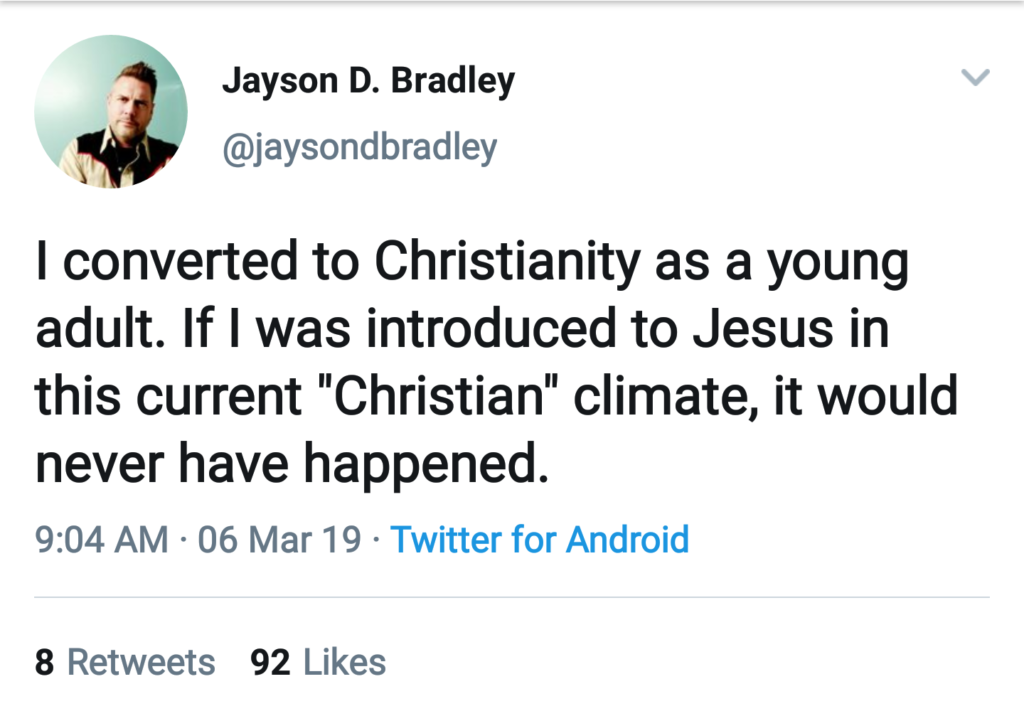March 8, 2019
Spiritual Direction in the Current Christian Climate
Spirituality
Increasingly, people “done with Christianity” are showing up in spiritual direction. White evangelical Christian support for Donald Trump through a troubled presidency is causing some young adults to “break up with their church” and others to avoid church altogether. [1]
I saw the statistics and heard lots of commentary on this, but it was a gut-punch to read what pastor and writer Jayson D. Bradley (@jaysondbradley) posted on Twitter recently.[2]

This post drove home to me how serious it is when Christianity is perceived as yoked to a political candidate or platform.
While Bradley might not have converted in today’s climate, it’s likely that he—and others like him—would still be attracted to the life of the spirit. As we are fond of saying in my denomination (United Church of Christ, UCC), “God is still speaking.” Except, it’s clear the word isn’t always leading people to the traditional church.
What a rich opportunity for those of us who pray and listen for a living!
What does Spiritual Direction have to offer the “nones and dones?”
Spiritual direction – at its best – offers a nonjudgmental exploration of a person’s spiritual path. Good spiritual directors meet clients where they are and simply assist them in a deeper awareness of the Divine, help them reflect on their life and experiences of the holy, and serve as a sounding board for a person’s discernment around important choices in life. Nones and dones, those with no religious affiliation or those exiting the faith of their upbringing, not only have no problem with this, they need someone in their life who doesn’t judge, doesn’t push and is not trying to convince them to settle into one particular path.
What can Spiritual Direction contribute to the current Christian culture?
Let’s start with what appears to be the root cause of this current Christian culture in the first place.
Fear.
Even though, as pollster Nate Silver tells us, the median
household income of a white Trump supporter is about $72,000 a year, when
polled they say they feel they have been “left behind financially.”[3]
It was the MAGA (Make America Great Again) that attracted them—issues of personal economic security, fear of terrorism, fear of immigrants and the prospect of turning the Supreme Court in their favor.
Being raised in a conservative church, I know firsthand that fear is baked into the evangelical’s experience of faith. You are saved “if” you do X, Y or Z (it differs from church to church). If you don’t, there’s hell to pay. That’s scary for those who believe it.
In spiritual direction, fear is not of the Spirit. Fear is real and must be faced, but our job is to hold space for the client to move—at their own pace–from fear to love.
Another troubling issue for the exiting Evangelical is coercion. Being told what they must believe and that believing incorrectly leads to eternal punishment is coercion, and it can be spiritual abuse for the sensitive person.
In spiritual direction, there is no coercion. A good director models God’s freedom and acceptance of a person just as they are. If all of Christianity could end the coercion, manipulation and abuse and adopt the spiritual director’s stance of compassion and non-intervention, I suspect there would be a lot fewer nones and dones.
And people like Rev. Bradley could rest in knowing that his younger self might indeed have experienced conversion.
Interested in learning more about spiritual direction or
finding a spiritual director? Check out my website www.teresablythe.net or take a look at
my book Spiritual
Direction 101, available from Amazon.
[1] Excellent essay on this at https://theascent.pub/how-donald-trump-broke-the-spell-of-evangelicalism-6ff54a188793
[2]Thank you to Jayson D. Bradley for allowing me to repost his twitter comment and use it to share my views on spiritual direction.
[3] Information from Nate Silver found at https://fivethirtyeight.com/features/the-mythology-of-trumps-working-class-support/




